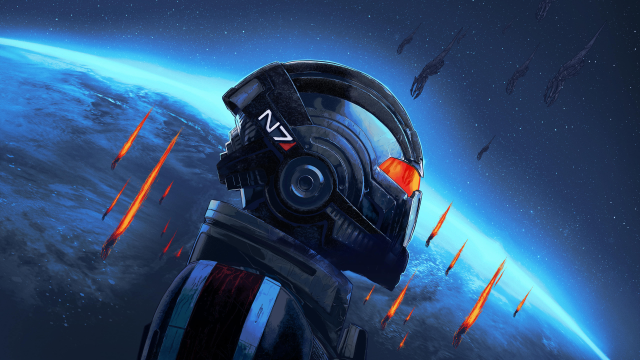After years of wondering when, not if, Mass Effect would ever make the leap from video games to film or TV, it would seem we’re at last on that precipice: Amazon has eyes on bringing BioWare’s sci-fi shooter/Garrus Vakarian dating simulator to streaming. But the question should be less if the Mass Effect series should come to TV, but how — and the answer is without its “main” character.
Commander Shepard is the star of the first three video games in the Mass Effect saga — in the fourth game, Andromeda, it’s Ryder, a character similarly largely defined by the player. Shepard is beloved, although not perhaps necessarily because they are a great character. Shepard is, in some ways, hard to define as having a personality when you scrape away the thing that makes Mass Effect still so loved, and the thing that makes an attempt to adapt Commander Shepard’s story to another medium such a dangerous prospect: so much of what we see in Shepard as players is what we ourselves put into them. Mass Effect is a game franchise defined by its incorporation of player choice, no matter how clear sometimes the limitations that influence can be made within its systems. Even if, on a macro scale across the games, players’ choices are relatively binary, or more about filling in the little flourishes here and there rather than the broadest strokes of its overarching tale, Commander Shepard remains a deeply personal character to people who play the Mass Effect games. We do more than just control Shepard from one plot point to the next, we guide what they say and what they believe in, we forge their friendships and their loves, we craft them as a person. Are they man or woman, paragon or renegade, are they queer, are they war survivors or orphaned soldiers, tech experts or psychic space-wizards? All the little choices people pour into that character make Shepard less of their own person, for better or worse, and instead our window into their place in Mass Effect’s universe.

Shepard’s nature as that kind of powerful cipher makes the possibility of a Mass Effect show simply trying to adapt them and the events of the original trilogy of games something of a nightmare. It’s not that it can’t be done — the games have long prided themselves on their cinematic framing and values, making it about as easy an adaptation as it could possibly be if literally translated. But bringing in a Shepard, whoever plays them, and trying to set a defined frame around the nebulous idea of who Commander Shepard is, feels like asking for trouble: and asking for it from a fanbase that has, to put it diplomatically, very much proven how vocal they can be about things they don’t like about the ways the series handled their choices. Even what might seem like the simple choice of whether or not adapting Shepard as John or Jane would be a decision that upends Mass Effect’s fanbase, and that’s before you even get to the granularity of weaving about their personality, their romances, or the way they conduct themselves across their story. So much of ourselves is wrapped up in our interpretation of Commander Shepard as Mass Effect players that the thought of seeing some version that is not just our own would be jarring.
So why even do it? It’s not just that adapting Shepard is a guaranteed way to disappoint the Mass Effect fan base in one way or another. Mass Effect’s world is home to more than just one story, and Shepard’s story has already been told. It’s a setting ripe for exploration beyond the conflict between the Commander and the Reapers. A Mass Effect show could follow in and around the shadow of Shepard — following characters we know before or after they crossed paths with Shepard, familiar favourites like Kaidan, Liara, Garrus, Thane, or Tali (or perhaps an anthology that could encapsulate the lives of its beloved expanded cast). It could show us the events that brought us to Mass Effect’s start point, like the Rachni War and the Krogan rebellions that came after, the Quarian’s creation of the Geth, or even the First Contact War between the Turians and Humanity. There are tales in between the games, especially the period of time in Mass Effect 2‘s opening where Shepard is, well, quite dead (they get better). With the addition of Andromeda to the canon, Mass Effect’s universe and potentiality exploded onto the scope of whole galaxies — and a show could explore what Andromeda set up, seemingly left behind after that game’s lukewarm reception, while we wait for whatever comes next in the franchise.
We know what Shepard’s story is already, and most importantly to Mass Effect players, we know what that story is to our own experience of the shape of it. If we’re going to take the next Mass Relay to TV stardom, Mass Effect should stand ready to do so beyond the shadow of its first hero — and get ready to lay the groundwork and introduce us to new ones beyond the Commander’s reach.
